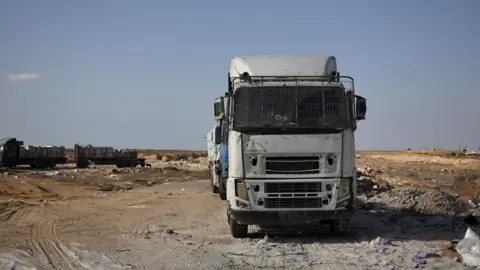In a tragic incident amidst the ongoing conflict in Gaza, a catastrophic accident has led to the loss of twenty lives and left over thirty individuals injured. The calamity unfolded when four trucks, which were part of a commercial convoy, overturned and crashed into a crowded area, as reported by the Hamas-run civil defense agency. Eyewitness accounts indicate that a large number of people had rushed to the vehicles southeast of Deir al-Balah in central Gaza, with many reportedly climbing atop the trucks. This reckless behavior caused the drivers to lose control of the vehicles, resulting in the horrific accident.
The situation had been precarious, given that the area was under Israeli military control, characterized by rugged and dangerous roads, as noted by Mahmoud Basal, a spokesperson for the civil defense agency. According to information from the private transport association currently operating in Gaza, a total of 26 commercial trucks entered the territory on that day, with six of them being looted – leading to the eventual overturning of four trucks, which resulted in this heartbreaking incident.
In the backdrop of this tragedy, Israel had recently begun to facilitate the gradual entry of goods into Gaza through the private sector in an effort to boost the volume of aid while reducing dependence on UN provisions. This was intended to alleviate the severe shortages of essential supplies. The approved items included baby food, fruits, vegetables, hygiene products, and basic staple foods. Press reports indicate that there have been increasing pressures to facilitate smoother humanitarian efforts in the region, and Hamas has voiced concerns over the desperate crowds that often swarm these delivery trucks.
Amidst another troubling incident, reports emerged from Jordan that an aid convoy of thirty trucks bound for Gaza was attacked by Israeli settlers, raising serious concerns about the safety and security of humanitarian efforts in the region. The convoy, which had crossed from Jordan, was met with hostility as settlers blocked the road and threw stones at the trucks, causing damage. This prompted a call for stricter Israeli intervention to ensure the safe passage of aid deliveries.
Moreover, the United Nations’ Food and Agriculture Organization (FAO) reported alarming findings indicating that the amount of accessible and undamaged farmland in Gaza has dwindled dramatically, now reduced to less than a square mile. This stark reduction equates to only 1.5% of Gaza’s total agricultural area, a decline from the previous figure of 4.6%. The FAO’s director-general, Qu Dongyu, has warned that Gaza is teetering on the brink of a full-scale famine, a dire situation exacerbated by a lack of sufficient food resources and adequate aid deliveries.
Within this context, the Hamas-run health ministry reported that the humanitarian crisis has led to the heartbreaking deaths of at least 193 individuals, including 96 children, due to hunger and malnutrition since the onset of the ongoing conflict. The alarming situation has drawn the attention of over a hundred international aid and human rights organizations, who accuse Israel of obstructing essential aid distribution.
In response, Israeli Prime Minister Benjamin Netanyahu has outright denied allegations of starvation in Gaza and insisted that the country is not blocking aid deliveries, countering claims made by various factions calling for international intervention. With approximately 90% of Gaza’s population of 2.1 million being displaced and living under overcrowded and dire conditions, the UN continues to advocate vigorously for the full and sustained entry of humanitarian supplies.
This unfolding crisis traces back to October 7, 2023, when Hamas launched an attack on southern Israel, resulting in the deaths of about 1,200 individuals. Following this, there has been a significant escalation of violence, with the Hamas-run health ministry claiming that at least 61,020 Palestinians have died due to Israeli military actions in Gaza since that time. The situation remains fraught with tension and humanitarian concern, with sporadic access to aid continuing to be a pressing issue as the conflict unfolds.











